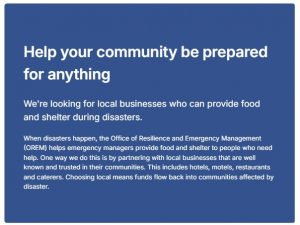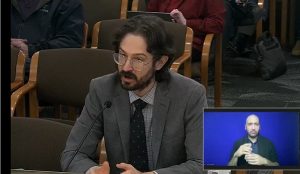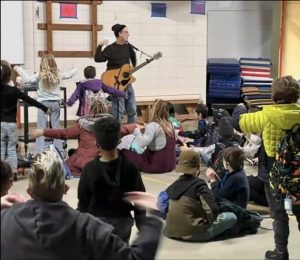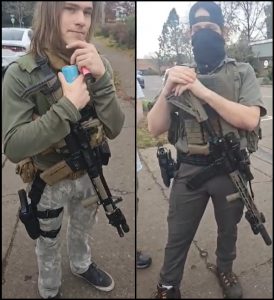Measure 110 repeal, HB 3115 complicate impact of Grants Pass decision in Oregon
10 min read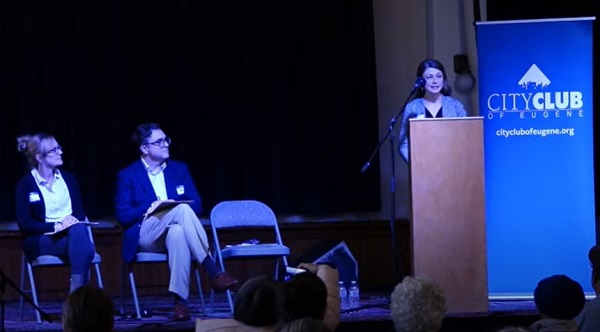
Presenter: What does the Grants Pass decision mean for our neighbors living on the streets? At the City Club Nov. 15:
Alyssa Gilbert (City Club of Eugene, program coordinator): Just going to provide some quick background info: In June of 2024, the case City of Grants Pass v. Johnson, the U.S. Supreme Court ruled 6-3 that the Eighth Amendment allows cities to punish people experiencing homelessness for sleeping and camping in public spaces. The Eighth Amendment prohibits the government from inflicting cruel and unusual punishments. This ruling means that cities can impose criminal penalties for public camping and sleeping even when individuals are homeless involuntarily due to a lack of available shelter and housing in the community.
[00:00:45] The Supreme Court majority reasoned that the ordinances punished acts, not the status of being homeless, because the ordinances would apply to anyone who sleeps outside in public regardless of whether they are a person experiencing homelessness, a student protesting, or a backpacker.
[00:01:02] The dissent countered that because sleep is a biological necessity, unhoused individuals who have no access to shelter cannot avoid sleeping outside, and therefore, such laws punish them for being homeless.
[00:01:19] Heather Marek (Oregon Law Center): Homelessness is fundamentally a housing issue.
[00:01:22] You can predict rates of homelessness in communities across the country based on the availability of affordable housing. And so even though homelessness seems to be an individual problem, and certainly we know that personal crises like losing a job or an eviction can contribute to a person finding themselves dealing with homelessness, there are societal patterns that we can measure. And whether a personal crisis like experiencing domestic violence results in homelessness depends greatly on the social context in which it occurs. It depends on whether there is housing or social safety nets for that person, say, if they’re fleeing a domestic violence situation.
[00:02:15] And we all know that there’s very limited housing in Eugene or in Oregon. Economists say that statewide we’re going to need something like 140,000 more units to meet the current need. And we have really low rates of vacancy for the rental housing and also homes for sale.
[00:02:34] And affordable housing is even more scarce. Eugene, for instance, here a third of renters pay more than half their income towards rent and 30% of your income is what’s considered to be sustainable.
[00:02:48] And one in five people in the city lives in poverty, which means that they make for an individual less than about $1,200 a month. Well, the median rent in Eugene is more than $1,200 a month. So for a person who’s in that situation, to be able to afford the typical unit, they would need to spend 100% of their income.
[00:03:12] And so a lot of people are just an emergency away from homelessness. And we know from our data that the overwhelming majority of evictions in Oregon are because people couldn’t afford to pay their rent.
[00:03:25] 82% of people experiencing homelessness in Lane County were previously housed here, which, to put it another way, our unhoused neighbors were previously our housed neighbors. And when people fall into homelessness, there’s often nowhere to go.
[00:03:44] Nationwide we have a shelter shortage, but Oregon is particularly dire. We have the second-highest rate of unsheltered homelessness. Two-thirds of people experiencing homelessness have no shelter. We have the largest share of families who are unsheltered.
[00:04:03] Eugene has three-quarters of its population that’s experiencing homelessness has no shelter and in the county we only have enough emergency shelter beds to meet the need of 18% of the numbers of people who are experiencing homelessness.
[00:04:18] So when there’s nowhere to go, people still need to sleep somewhere, and usually it’s outside, usually in public spaces, and quite often that is illegal.
[00:04:30] And so that’s the context in which the Grants Pass case arose. And in Grants Pass, the situation was even more dire than that. There was a 1% vacancy rate, meaning 1% of units would be available to rent at a given time.
[00:04:47] And there were 600 people counted as being unhoused when the case started and the one place that sort of functioned like a shelter had 138 beds but it also had a lot of restrictions based on gender, work requirements, religious practice, and a bunch of other regulations. So, not enough beds and also beds that a lot of people couldn’t access even if they wanted to.
[00:05:14] And so a lot of people were living outside, still are living outside. This led the city council to meet to discuss what they called ‘the current vagrancy problems.’ Officials talked about things like busing people out of town. The city council president suggested just making the city as uncomfortable as possible so people would just leave.
[00:05:37] And one thing they settled on was aggressively enforcing the camping law. The camping law prohibited sleeping anywhere in public at any time with as little as a blanket. And it involved an enforcement scheme that would allow for fines that would snowball, and then also that could lead to trespass tickets that would carry hefty fines that would be misdemeanors and so could also carry jail time.
[00:06:08] Some longtime residents filed the lawsuit on behalf of themselves and other involuntarily homeless individuals, arguing that it punished their status of homelessness under the Eighth Amendment, and they drew from a line of cases that had held that it’s cruel and unusual punishment to punish someone for their mere status.
[00:06:27] There was one case in particular, Robinson v. California, that took place in the ’60s where it dealt with a law that prohibited the status of being addicted to narcotics. And the court said that you can punish things like possessing drugs or selling drugs or even behavior that people engage in after they’ve used drugs that’s criminal, but you can’t punish people for merely having an addiction. That’s like punishing someone for being a leper. And the court said that even a day in prison would be too much for punishing someone for merely having a cold.
[00:07:03] And in 2019, the 9th Circuit Court of appeals drew from that case in Martin v. Boise and held that the government can’t punish homeless people for resting or sleeping outside when they have no access to shelter; that sleeping outside is an unavoidable biological act inseparable from the status of homelessness. That is what it is to be homeless. And it’s unconstitutional to punish simply sleeping somewhere in public, if one has nowhere else to do so.
[00:07:33] In this case, the court, the district court, the trial court, and the appellate court, 9th Circuit Court of Appeals, agreed that the Grants Pass ordinance violated the Constitution. They said, you could still have restrictions on when, where, and how people engage in these sleep, or camp, as they put it. But you can’t punish it all the time everywhere. And you can still enforce health and safety laws like around drugs and public urination or lighting a fire. But that’s kind of a separate matter from punishing people for this unavoidable act of sleeping.
[00:08:11] And we know the case made its way up to the Supreme Court. And the U.S. Supreme Court reversed, overruling Martin v. Boise. Justice Gorsuch wrote for the majority and the court concluded that this is punishing actions, the actions of the conduct of camping and that it would apply to anybody, not just someone who has the status of homelessness.
[00:08:32] Justice Sotomayor wrote for the dissent, arguing that criminalizing a bodily function is essentially the same as criminalizing the person, just labeling it as an action. It’s still punishing the person for who they are.
[00:08:50] And so you’re punishing sleeping with a blanket, but that’s essentially the same as punishing someone for being homeless.
[00:08:56] So moving forward, the thing that I think is important to note legally speaking, both the majority and the dissent acknowledged that this case just dealt with the Eighth Amendment. It didn’t decide whether these ordinances are legal under every doctrine. In fact, they recognized that other constitutional provisions protect people’s rights, perhaps in this context as well, and that states and local governments can enact their own protections above and beyond what the Eighth Amendment would provide to deal with these situations.
[00:09:29] And specifically, they mentioned ORS 195.530, an Oregon statute, which was enacted as House Bill 3115 in 2021, and that law requires that regulations around engaging in access survival like sleeping and sitting and staying warm and dry in public, that they be objectively reasonable as to time, place and manner with regards to persons experiencing homelessness and that reasonableness would be determined based on the totality of the circumstances (there’s a mouthful), but that would include considering the impact of the law on people who are experiencing homelessness.
[00:10:14] And so it requires cities to take into account the experience of people who are unhoused, you know, what they could reasonably comply with how the laws impact unhoused residents. But it also gives a lot of latitude to cities to come up with their own solutions and to have time, place, and manner restrictions that make sense given their local characteristics.
[00:10:40] Presenter: A Eugene attorney looked more closely at House Bill 3115.
[00:10:45] R. Everett Meadows: I’m Everett Meadows. I am a Eugene attorney and run a nonprofit podcast called the Oregon Reporter Podcast which is, our mission is to keep Oregon attorneys apprised of current law.
[00:10:57] Now House Bill 3115, which Heather mentioned, is really important in this context because although this Grants Pass decision is clearly an Oregon case, it’s unclear to me and I think to a lot of people what the actual significance of the decision is within the state of Oregon.
[00:11:16] Because after the Martin v. Boise decision, Tina Kotek, then Speaker of the House, pushes forward this relatively comprehensive legislation, but that is very unclear about what it’s intended to do, probably in part because it’s intended to be read along with those decisions, Martin v. Boise, and so we read these things together.
[00:11:40] Well, now with the reversal of Martin v. Boise, how do we read House Bill 3115? And there’s been an incredible amount of conversation amongst legislators in the state about that very issue. What does this mean knowing what we know now?
[00:11:58] Presenter: He described how Portland and Multnomah County adopted conflicting views on homelessness, after Measure 110 was replaced with deflection programs.
[00:12:11] R. Everett Meadows: Portland’s had a really interesting relationship with deflection and homelessness. So these programs are experimental. They’re varied county by county and we don’t know how they go in the future if they’re successful and the counties want to keep them going.
[00:12:26] I’m going to go through a bit of a timeline here, in May, after oral arguments, but prior to the SCOTUS Grants Pass decision, the Portland City Council approved an ordinance proposed by Ted Wheeler requiring folks camping on public property to accept shelter when available, and the ordinance includes a bunch of other restrictions.
[00:12:47] This gets pushed forward and allows for seven-day jailing period, $100 fine; however, in July, when Portland rolls this program out, Multnomah County refuses to shelter the first people to get arrested under this program. So now all of a sudden we’ve got counties fighting with municipalities about what’s fair, what’s humane, and it also, I think, highlights the issues here.
[00:13:17] Heather Marek (Oregon Law Center): Just one comment on House Bill 3115, that I think cities advocated for a more flexible approach because circumstances can be so varied. You know, Portland is very different from a small rural town on the coast, or Eastern Oregon. And, you know, cities and counties had a year and a half, and there was a lot of deliberation around the state, and a lot of cities made changes to their local ordinances.
[00:13:46] Although there’s a lot of conversation about, well, what would be objectively reasonable in a particular community, given all of the circumstances, there actually have been very few challenges to ordinances around the state under the law, that cities have come up with policies. And, you know, there’s not a lot of litigation, there’s only been one lawsuit filed under the law and that was in Portland. As previously said, they repealed the old law after that case was filed and then they implemented a new one that involves giving an offer of shelter to folks and trying to work with folks.
[00:14:19] And so you know there’s a baseline protective of people’s rights and their humanity and also the law allowed for a lot of flexibility because our cities are diverse…
[00:14:33] Heather Marek (Oregon Law Center): I think it’s important to remember that essentially this is a humanitarian crisis that overwhelmingly involves people who were previously housed in our community, becoming unhoused and having nowhere to go.
[00:14:49] And also, just how miserable it is, outside in the winter when it’s like 39 degrees and pouring rain. I went on outreach a couple of weeks ago with a community partner and it was raining and it was cold and I was like, I can’t wait to go home. And we met this woman who had been discharged from the hospital, like that was having kidney failure and had this bag full of medications.
[00:15:14] I think it’s important to just remember people’s humanity and maintain empathy and to consider what the social science shows, that providing housing, social support, that these are the things that actually have a statistically significant impact. And so I really think pushing for those solutions, even though they take time, is ultimately what’s going to alleviate our collective frustration with this horrible humanitarian crisis.
[00:15:43] Presenter: At City Club, Heather Marek and Everett Meadows look at homelessness in Oregon after the Grants Pass decision.
Image courtesy City Club YouTube channel.
See also: HIV Alliance helps people move from encampments into housing

